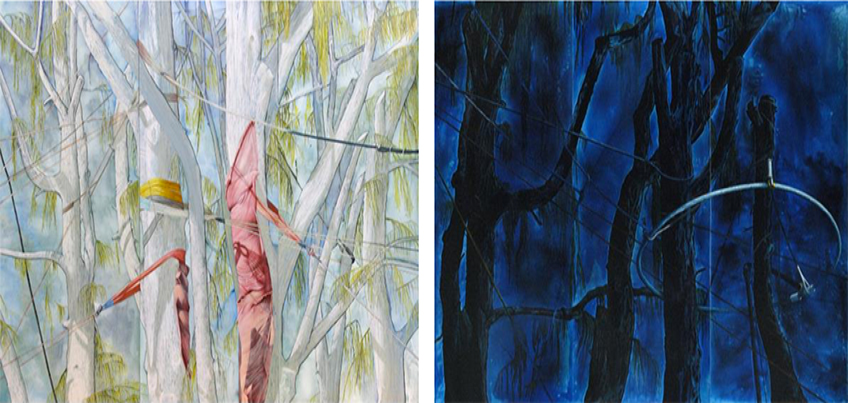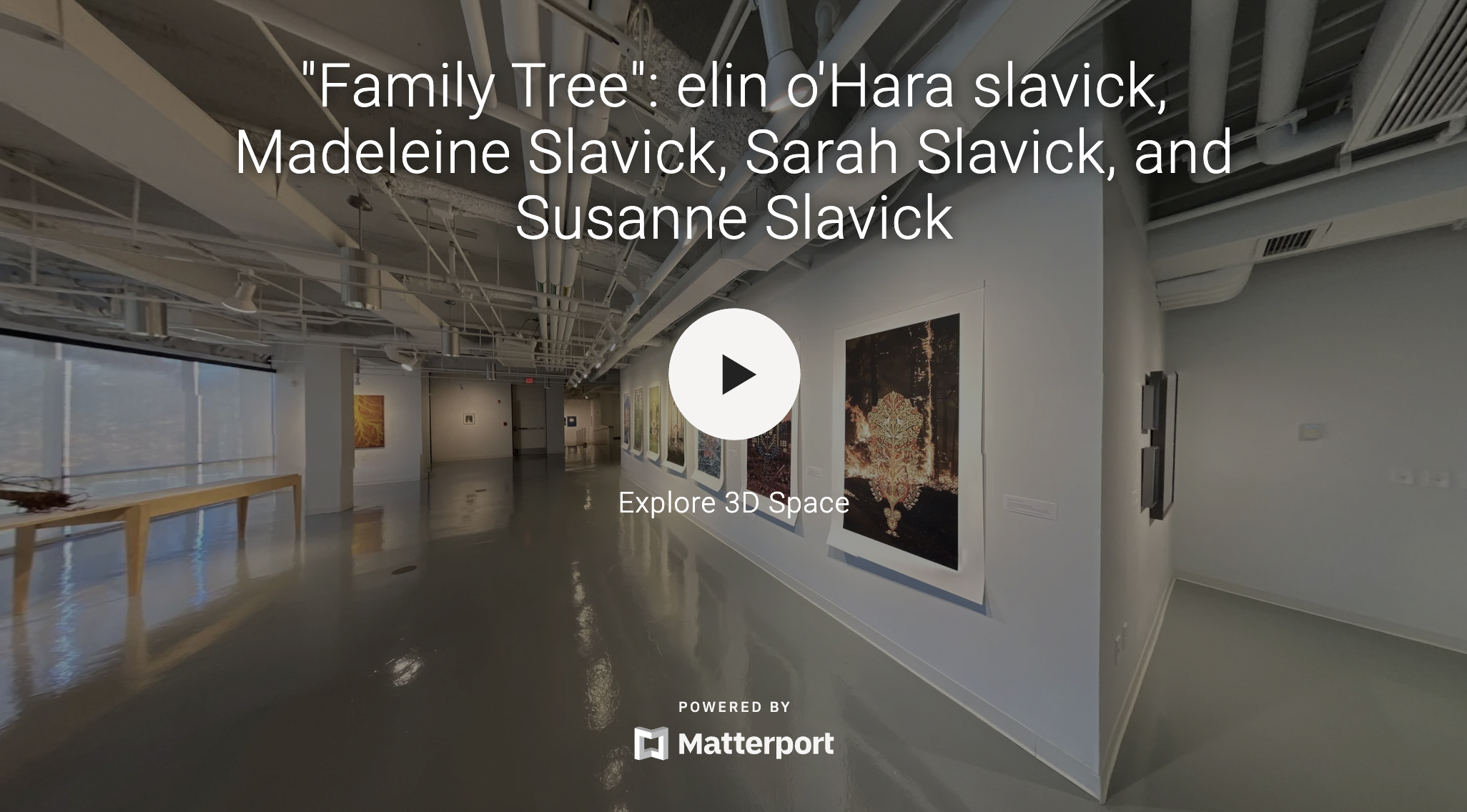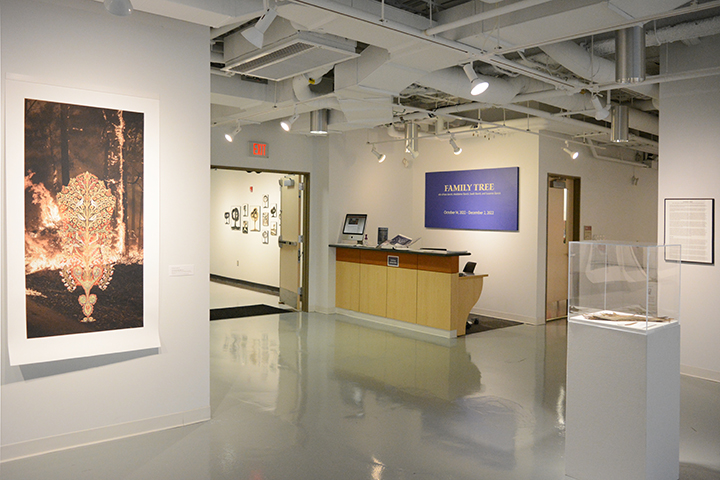


"Family Tree": elin o'Hara slavick, Madeleine Slavick, Sarah Slavick, and Susanne Slavick
October 24 - December 2, 2022
View a virtual tour of the exhibition
View images from the exhibition
The show premiered in 2021 (with its original title, Family Tree Whakapapa) at Aratoi Museum of Art & History in Masterton, New Zealand, and then traveled to the Wallace Arts Centre in Auckland before arriving in an expanded version at SUNY Cortland. The multi-media exhibition will be available to the campus community and the public, both in virtual and in-person format.
The creative practices of all four sisters intersect through common interests in the natural world, poetry, and related fields such as curating, art advocacy, and teaching. As curators, painters, photographers, and writers, all have incorporated images of trees in social, political, and environmental conditions — trees that stand as refuge and livelihood, consumed and consuming, under assault and triumphant, as historical record and as the harbinger of things to come. The exhibition offers perspectives both unsettling and soothing as nature increasingly reflects salient issues of our times. Their artists' statement reads, "In its beauty and bounty, nature is often regarded as benign and apolitical. We do not expect a tree to assume an editorial stance or embody ideology. The conceptual, analytical, and sensual intersect in Family Tree with works that probe the multitude of relations within and between trees and humans. Branching out to, and from, the world, the artists address a variety of concerns."
Kimberly Lamm, Associate Professor in the Program of Gender, Sexuality and Feminist Studies at Duke University, wrote. "This exhibition brings together the artwork of four sisters living in different parts of the globe and focuses on the related but distinct ways they engage with the arboreal imagination. Tangled into their photographs, paintings, life histories, and political commitments, the trees in their artwork are intricate lines, bold shapes, diffuse traces, and stylized patterns. Defying the ease with which the genealogical and botanical connect in the figure of the family tree, the Slavick sisters make it a thing of wonder: rooted in the ground and multiplying in our imaginations, family trees are botany and biology written with longing, hope, history, and loss".
Through their individual perceptions of nature, the sisters explore the historical, environmental, and philosophical significance of trees. Based on her experiences in Japan, elin o’Hara slavick presents photographic works that bear witness to the ongoing aftermath of atomic bombs in Hiroshima and Nagasaki and the nuclear power disaster in Fukushima. Madeleine Slavick's photographs reveal dichotomies and their collapses in our experience of nature in environments both rural and urban—they decry the marginalization of trees. Sarah Slavick's paintings explore the underground life of trees in an elegiac series that conveys both grief and hope for what is threatened and for what might survive through possible strategies that trees offer—for all species on the planet. Susanne Slavick hand paints trees derived from the 'tree of life' carpet designs overprinted on scenes of environmental destruction and depredation. These trees do not lie down like doormats; they rise up and persist, suggesting the possibility of recovery.
About Artists
elin o’Hara slavick is an Artist-in-Residence at the University of California, Irvine. She was a Professor of Studio Art, Theory and Practice at the University of North Carolina, Chapel Hill, from 1994 until 2021. Her interdisciplinary work critically explores war, memory, exposure, memorials, cartography, history, labor, feminism, the body, politics, and utopia/dystopia. Slavick has exhibited her work internationally, and her work is held in many collections, including the Queens Museum, The National Library of France, The Library of Congress, The Nasher Museum of Art, and the Art Institute of Chicago. She was represented by Cohen Gallery in LA. Slavick is the author of two monographs - Bomb After Bomb: A Violent Cartography with a foreword by Howard Zinn, and After Hiroshima, with an essay by James Elkins; a chapbook of surrealist poetry, Cameramouth; and Holding History in Our Hand for the 75th commemoration of Hiroshima and Nagasaki. She has held artist residencies in Canada, France, the United States, and Japan, most recently as a Huntington Art and Research Fellow at Caltech. Her work has been featured in the New York Times, Los Angeles Times, Images Magazine, FOAM, San Francisco Chronicle, Asia-Pacific Journal, Photo-Eye, and Actuphoto: Actualite Photographique, among other publications. She lives in Irvine, California, with her epidemiologist husband, Dr. David Richardson, two children, a dog, and a cat.
Madeleine Slavick 思樂維 is the author of several books of photography, poetry, and non-fiction, including Fifty Stories, Fifty Images; delicate access; Something Beautiful Might Happen; and Round – Poems and Photographs of Asia. Her writing and images have been published internationally by Akhbar Al-Adab (Cairo); Art News, Art New Zealand, PhotoForum (Aotearoa New Zealand); Asia Literary Review, Cha: An Asian Literary Journal, Dislocation (Hong Kong); Guernica, Monday Artpost (Canada); Mascara Literary Review (Australia); Poeteka (Albania); Prairie Schooner, Tinfish, Vice-Versa (USA); Quarterly Literary Review Singapore, Softblow (Singapore), Postcolonial Studies (England), Pressed (Taiwan) and Writing Macao, among others, with translations into Albanian, Arabic, Chinese, and German. Currently residing in New Zealand, she identifies as a Hongkonger after living there for nearly 25 years.
Sarah Slavick is a member of the Fine Arts faculty at Lesley University in Cambridge, Massachusetts. Among her rewards are a Massachusetts Cultural Council grant in Painting, and artist residencies at the Baer Art Center in Iceland, the Millay Colony, and the Bemis Center for Contemporary Art. Last spring, her work was included in In Praise of Form at the Piano Craft Gallery which was reviewed in the Boston Globe. Past exhibition highlights include Big Bang! Abstract Painting for the 21st Century at the DeCordova Museum and Sculpture Park, and Dix Artistes Americaines in Strasbourg, France. Her work has been featured in: Interalia magazine, an online publication concerning interactions between the arts, sciences, and consciousness; The Boston Globe, Hyperallergic, an online journal of contemporary perspectives on art and culture; Diacritics, the online journal of literature and art; Posit 9, and more. She has participated in the larger regional community through open studio events, charity auctions and benefits for non-profits, and continues to act as union leader, activist, artist, gallery director, curator, critic, juror, and teacher. She lives with her husband in Jamaica Plain, Boston.
Susanne Slavick is an artist, curator and University Professor of Art Emerita at Carnegie Mellon University. She studied at Yale University, Jagiellonian University in Krakow, and Tyler School of Art in Rome and Philadelphia. Her traveling curatorial projects include When the Bough Breaks (2019); Marx@200 (2018); Unloaded (2015-19); and Out of Rubble (2011-15). Recent exhibits include those at University of Virginia, Gettysburg College, McDonough Museum of Art, Chicago Cultural Center, and the Godwin-Ternbach Museum. Honors include multiple grants from the National Endowment for the Arts and the Pennsylvania Council on the Arts, the 2019 College Art Association Distinguished Teaching of Art Award and Carnegie Mellon’s Henry Hornbostel Teaching Award. She has published in books and journals including: Formations of Identity: Society, Politics, and Landscape; Cairo: Images of Transition; Journal of Visual Culture; Technology and Culture; Hyperallergic, and Cultural Politics.
About Program
The Dowd Gallery will present supporting programming for Family Tree in both virtual and in-person formats. Events will include a quartet of artist's talks, documentary screenings, and presentations that contribute additional perspectives on the exhibit. All programs are open to students and the public free of charge.
A guided tour kicks off the program during the opening reception on Wednesday, October 26, with elin o’Hara slavick, Artist-In-Residence at the University of California, Irvine; Sarah Slavick, College of Art and Design faculty at Lesley University, Cambridge, MA; and Susanne Slavick, University Professor of Art Emerita, Carnegie Mellon University, Pittsburgh, PA. Three of the four Slavick artists will share insights on the conceptual premise of the exhibition, their individual pieces on display, and their relationship to each other. Audiences will have another opportunity to interact with the group during a virtual event on Wednesday, November 2, and to ask questions about the artists' creative practice and inspiration for their work.
Further lectures are scheduled that address related environmental topics from both scientific and cultural standpoints. On Thursday, November 17, Jeremy Jimenez, Ph.D., Associate Professor at the Foundation and Social Advocacy Department at SUNY Cortland, will deliver a talk titled Trees Can't Sequester Mercury; Why Climate Is the Wrong Focus. Dr. Jimenez explains, "Climate Change is only one of nine planetary boundaries, yet it gets considerably more 'press' than any of the other dire threats to a functioning biosphere. This talk will first present a brief synopsis on some of the other threatened boundaries and then speculate as to why many educators and policymakers might focus primarily, if not exclusively, on climate change when discussing 'solutions' to our myriad ecological predicaments".
On Tuesday, November 29, Tucker Marder and Isla Hansen, the respective Director and Co-Programmers of the Folly Tree Arboretum, will speak about their project as a cultural archive of trees dedicated to environmental storytelling. The Folly Tree Arboretum is located in Springs, NY. Founded in 2013, the organization works to promote an exuberant environmental ethic through art and science. Trees in the collection include a Sycamore that went to the moon on Apollo 14, Osage Orange ‘Cannonball' and an Oak tree that owns itself.
Watch the Talk
Poets Bertolt Brecht and Adrienne Rich discuss why we must ‘talk about trees,’ so the gallery program will conclude with a poetry reading performed by SUNY Cortland faculty members on Thursday, December 1. Heather Bartlett, Howard Lindh and the collective will recite poetry by John Ashbery, Margaret Atwood, Ross Gay, Joy Harjo, Terence Hayes, Pablo Neruda, Ross Gay, Valencia Robin and others, as well as two of the Slavick sisters. The poems were selected by the artists to create a lyrical dialogue with their work.
About Contributors
Isla Hansen is a Pittsburgh-based artist making objects, tools, toys, sculptures, performances, systems, interactive installations, animations, workshops, and videos that playfully and colorfully address the ways in which bodies connect to technologies in the world around us. Isla’s work sets in motion new and sometimes crude means of image-making in order to break down processes of technological mediation and draw attention to the soft or clunky reality of our human bodies. She combines soft and hard materials, digital fabrication, real time media, and techniques from online DIY culture to blur consumer-producer boundaries and challenge the way in which industrial forms of production displace visible forms of human labor.
Isla’s solo and collaborative work has been exhibited at the Children’s Museum of Pittsburgh, the Akron Art Museum, the Columbus Museum of Art, the Lightwell Gallery at the University of Oklahoma, the Moss Art Center at Virginia Tech, MoCA Cleveland, the Hammer Museum in Los Angeles, Public Pool Gallery in Los Angeles, the Parrish Art Museum in Watermill, NY, the Gallery at Industry City in Brooklyn, Three Four Three Four in Brooklyn, and Guild Hall Center for Visual and Performing Arts in East Hampton, NY. Isla has been the recipient of a Robert Rauschenberg Foundation Residency, the Dedalus Foundation Master of Fine Arts Fellowship, Frank-Ratchye Fund for Art at the Frontier grants from The Studio for Creative Inquiry, and a three year fellowship from the Center for the Arts in Society. Isla grew up in Philadelphia, Pennsylvania and Lewiston, Maine. She currently teaches sculpture in the School of Art at Carnegie Mellon University. Isla also currently serves as Director of Programing at Folly Tree Arboretum.
Tucker Marder is an artist living and working between Pittsburgh, Pennsylvania and Long Island, New York. Working in a wide range of mediums including puppetry, film and horticulture Tucker uses humor and absurdity to promote an exuberant environmental ethic, countering pessimistic prevailing trends towards ecological hopelessness. He has exhibited at the National Aviary, Phipps Botanical Garden, and the Store Front for Art and Architecture. Tucker is the founder and director of the Folly Tree Arboretum in Springs, NY.
Jeremy Jiménez received his doctorate in International and Comparative Education at Stanford University in 2017. He currently researches and teaches (future teachers) about race, class, and gender issues in education and how they intersect with environmental justice. He has previously taught high school social studies for over a decade in Norway, the USA, and Venezuela. Having now studied, conducted research, and/or traveled in over 160 countries around the world, these days Jeremy prefers to spend his time hiking, biking, and skiing in the woods and cultivating his permaculture garden. and admiring the beautiful biodiversity surprises that emerge. He is an Associate Professor in the Foundations and Social Advocacy Department at SUNY Cortland.


